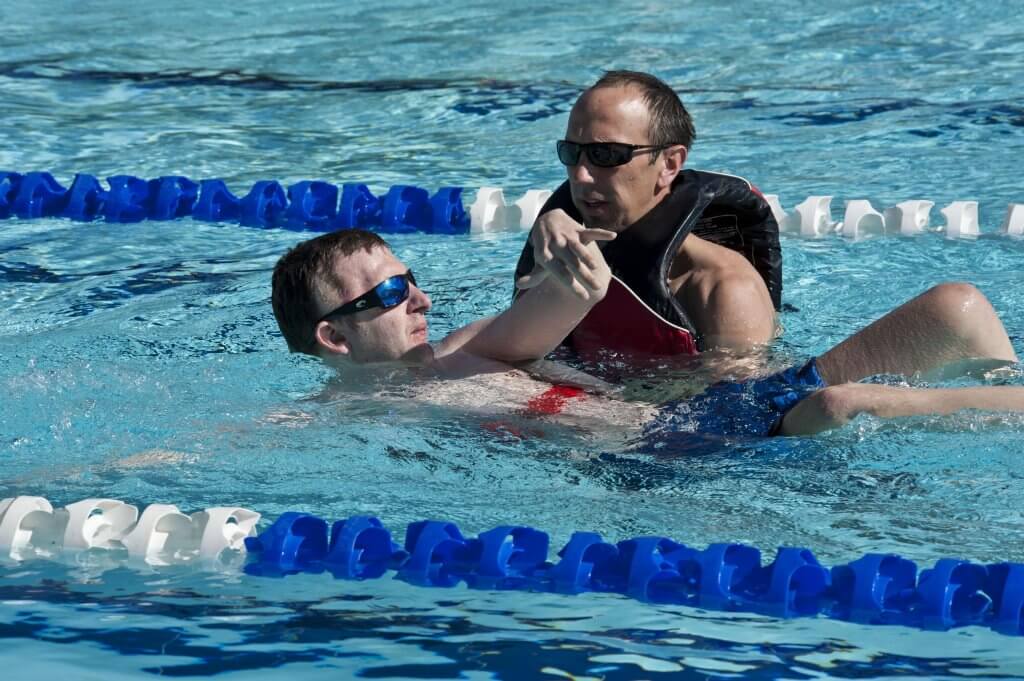Orlando, Fla. — A three-time bronze medalist at the Department of Defense Warrior Games will return to competition this weekend, testing his recumbent-bike cycling and indoor rowing skills against fellow veterans.
“In so many ways, it’s given me purpose,” said Cory Remsburg, a former Army Ranger (75th Ranger Regiment) who was wounded in Afghanistan in 2009.
The annual athletic event pits 300 wounded, ill and injured active-duty/veteran military athletes, from around the world, against one another in myriad events.
Cory’s squad went searching for a high-level target in the Kandahar area when an IED blast brought death and severe trauma to his group. Cory himself was left with acute brain damage and paralysis on the left side of his body.
“So he knows he has these challenges,” said father Craig Remsburg, sitting next to Cory during the interview with AmeriForce Media. “And during these games, he will overcome that.”
Cory valiantly strives to articulate his points and emotions, but his dad does a good job conveying them throughout the interview.
“And you know, they had to modify the rower to a one-arm one handle because he’s paralyzed on that left side,” Craig said. “And the seat doesn’t move. So there’s a lot of things you have to adapt. But at the end of the day, when you line all these people up, everybody’s just tugging that rope and trying to get there.”
RELATED: CrossFitting through cancer: Former Titan Games competitor Matt Cable talks athletic hustle
At the time of the incident, Craig was a senior human resources principal and in Canada for a new-employee orientation.
“So it was my turn in the afternoon, and I got up, and my phone rang … And I looked at it before I started to disconnect,” Craig said. “And it had more digits than what it was supposed to. And from our experience, that means it’s a satellite phone call from overseas.”
He assumed it was Cory.
“And then a gentleman that I had never talked to before says, ‘This is Cory’s company commander.’ And at that point, I knew something was wrong.”
Craig said Cory sustained a devastating brain injury that required the removal of one-third of his brain. Shrapnel had penetrated the right side of Cory’s skull, impacting the frontal and parietal lobes. He also fell into a non-induced, three-and-a-half month coma after the incident.
“So if he could wake up, he would wake up. He just didn’t wake up,” Craig said.
But the day came when his consciousness awoke, and an eye opened. A week later, a leg. And then the other eye. Craig said it took two months for Cory to swallow, and eight months elapsed before he could utter a word.
“He’s not gonna let the injuries define him,” Craig said. “He refuses. He’s always refused that. He’ll find a way around it.”
‘You’re not alone’
The Remsburg family was helped along the way by the Fisher House Foundation. The organization provides comfort homes to the families of wounded military personnel and veterans. Cory had stays in numerous locations — Landstuhl Regional Medical Center in Germany, Bethesda Naval, Tampa Polytrauma Transitional Rehabilitation in Florida — and a Fisher House accommodated them each time.
The commonality with others at the Fisher Homes was a difference maker in the emotionally painful process.
“We were always at a Fisher House,” Craig said. “And it’s the camaraderie, it’s the togetherness of other parents, spouses and other loved ones, that after you’re done at the day in the hospital, you’re going over there, you’re tired, he probably had eight to 12 hours already, and you’re not alone.”
There are 92 Fisher Houses in operation, and almost all are within walking distance of the hospital. Families stay for as long as they need to, free of charge.
“We get involved very early in the process,” said Ken Fisher, chairman and CEO of the Fisher House Foundation. “… We don’t see, you know, a lot of smiling faces, we see a lot of uncertainty. These men and women were living with horrific injuries that required longer hospital stays and longer rehab.”
Next up for Cory was a transitional living center in Pomona, California. Cory stayed there for two-and-a-half years then returned home to Phoenix, Arizona.
The Ranger Lead the Way Fund gifted a house to Cory, helping him regain some of the independence that the injuries took away. Homes for Wounded Warriors, started by former NFL edge rusher Jared Allen, teamed up with the Ranger Lead the Way Fund and retrofitted the house to Americans with Disabilities Act standards. Cory eventually left Arizona and headed back to Florida. He now lives in a pre-planned community in the Orlando area.
Warrior Games participation could help others
The Warrior Games medalist now seems to have his groove back and the characteristic drive that had always been a part of him.
“And so, as a family, we’re just proud that this guy wakes up and he’s ready to chomp,” Craig said. “You know, doing something to better himself that day.”
Cory humbly deflects the attention placed on him but hopes his story can inspire and encourage others to achieve what they might have thought was unachievable.
“What if we can help others somehow? Just by sharing the story,” Craig said. “Cory showing up at an activity means a lot. And for him to put himself out there, on display at the Warrior Games, competing with other individuals. It could light that little flame on somebody else, saying, ‘Damn, if he can do it, I wonder if I can do it?’”
Comedian Jon Stewart will emcee the Warrior Games opening ceremony, and singer-songwriter Darius Rucker will perform a musical set.

